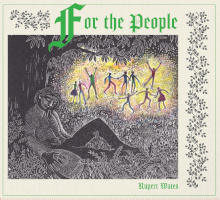The Graham Album Review #2104

Click on CD Cover for Audio Review in streaming mp3 format | |
Rupert Wates: For the People
(Independent release, as broadcast on WVIA-FM 2/23/2022)

Click on CD Cover for Audio Review in streaming mp3 format | |
Rupert Wates: For the People
(Independent release, as broadcast on WVIA-FM 2/23/2022)
The English folk scene that arose in the 1960s has always been something of an esoteric genre on this side of the Atlantic. Groups like Fairport Convention and the Pentangle, as well as artists like Nick Drake and John Martyn have had a lasting influence but, it seems mostly on other musicians. But the genre’s fans remain, and some some of the performers who arose back then are still active like Richard Thompson a founder of Fairport Convention. And along the way other performers of later generations have come along drawing on the style that incorporates traditional British Isles folk songs with more contemporary influences.
This week, we have an album that epitomizes the English folk style in the 21st Century. It’s by Rupert Wates, and it’s called For the People.
Rupert Wates was born in London and studied at Oxford University. In the 1990s, he dedicated himself to songwriting, working with musicians in his hometown, and then living in Paris before coming to the US, and settling in the New York in 2006. Over the years, he has released some nine albums, and tours widely. Among his projects was one called “Joe’s Cafe” with a series of songs based on historical events, with each sung by a different vocalist.
His new album For the People is quite the opposite. It is almost entirely solo, with just vocal and guitar, with original songs that sound as if they are quite traditional, some based on folk legends or creating the storylines that evoke British Isles folklore.
There are only three guests who make an appearances on the album, which was recorded over only two days on Long Island at the end of November 2021. Appearing are vocalist and singer-songwriter Rorie Kelly and Stacey Lorin on backing vocals and violinist Adrianna Mateo. Each is heard on only one piece. But what holds the album together musically, is Wates’ impressive finger-picking guitar work. The accompaniment rarely sounds sparse. And his warm baritone vocal is in the classic English folk style, resembling Richard Thompson.
The songs all have a kind of timeless quality, some of which have a lyrical line that could take taken place centuries ago. Three of the songs have to do with sailing the seas.
But opening is the title piece For the People, which he describes as a “love song to the human race.” It epitomizes the sort of classic sound of the album. <<>>
The first of the nautical songs is called To the Sea. Wates writes that since England is an Island, the sea is often a setting for traditional folk tales. <<>>
The album contains two tracks that are medleys of a pair of songs each. The sequence of All Fair Ladies and Spanish Galleon features a guest appearance by Rorie Kelly. Wates writes that the first half was based on the legend of King Arthur, who is asked “What is it that woman most desire” while the second half is written from the standpoint of a woman jilted. <<>>
Taking a more somber tone is The North Road based on a folk tale of a murderer who confesses after having a “religious awakening.” Wates’ guitar work nicely propels the song along. <<>>
Also with a nautical theme is a fanciful song called Oh Captain the story of a mermaid whose home under the sea was being blocked by a ship’s anchor. She tries to get captain to weigh the anchor. <<>>
Ullswater Cove features the violin of Adrianna Mateo, and is one of those original songs that sounds like traditional lore. It tells the tale of star-crossed lovers. <<>>
The other of the medleys is a pair of songs set in World War One. A Florin to the Beam and Hills of Blue Heather. Both are about lovers separated by the war. <<>>
The album ends with The Dance of Joy which Wates describes as a bookend to the first piece and its celebration of humanity. A group of family and friends are brought in for a final chorus. <<>>
For the People, the new tenth album from English-born US resident Rupert Wates is in the classic English folk style, songs based on some traditional lore, together with some excellent acoustic guitar work. The solo recording sounds quite full thanks to Wates’ skill on his instrument, and the all-original songs do a great job in evoking the timeless quality hinting at, or inspired by events of past centuries.
For audio quality, we’ll give the album an “A.” The sound is clean, warm and authentic. The music is so well-contained that studio effects would only detract from the performance.
English folk fans don’t get a lot of new releases coming along these days, but Rupert Wates’ new album is an exemplary work that embodies the best qualities of the genre.
(c) Copyright 2022 George D. Graham. All rights reserved.
This review may not be copied to another Web site without written permission.
 To Index of Album Reviews | To George Graham's Home Page. | What's New on This Site.
To Index of Album Reviews | To George Graham's Home Page. | What's New on This Site.